“Kiska is a terrible president, he is a puppet,” a forty-year old woman tells me in a smoke-filled pub located in the middle of the largest housing project in Bratislava, Petržalka. Her friend is nodding her assent, but after a while admits that she voted for Kiska. “I have been voting for the lesser evil for years, I voted for Kiska against Fico because I hate Fico – but now I feel that there is no good alternative to the Smer government. I wish Fico would weather this,” she concludes. The man sitting at our table, about forty-five, nods. “The opposition is waiting, but who is the opposition? Fascists, the mafioso Kollár, crazy Matovič and then there is Sulík, who wants to back out of the European Union.”
All three agree on one thing; that the people in the streets have no idea what they are protesting for. “Maybe they think they are marching for freedom, but no one is trying to take that from them – Slovakia is free,” one of the women states.
The opposition is waiting, but who is the opposition?
All three have been living in Petržalka and none of them have followed politics too closely, but they have become more interested now that emotions are running wild. And they are afraid of what is to come. In protests, they see uncontrolled emotion, which they find a bit ridiculous. “Us Slovakians, we are like the Albanians,” says one of the women. “We embrace new things with passion, but now people who have kept their mouths shut for years are protesting, and they are joined by students, and by people who will protest against anything because they like the emotion. But it is not the entire country, as it has been suggested in the media, and you can count on the opposition, which wants to get us out of Europe, to use that.”
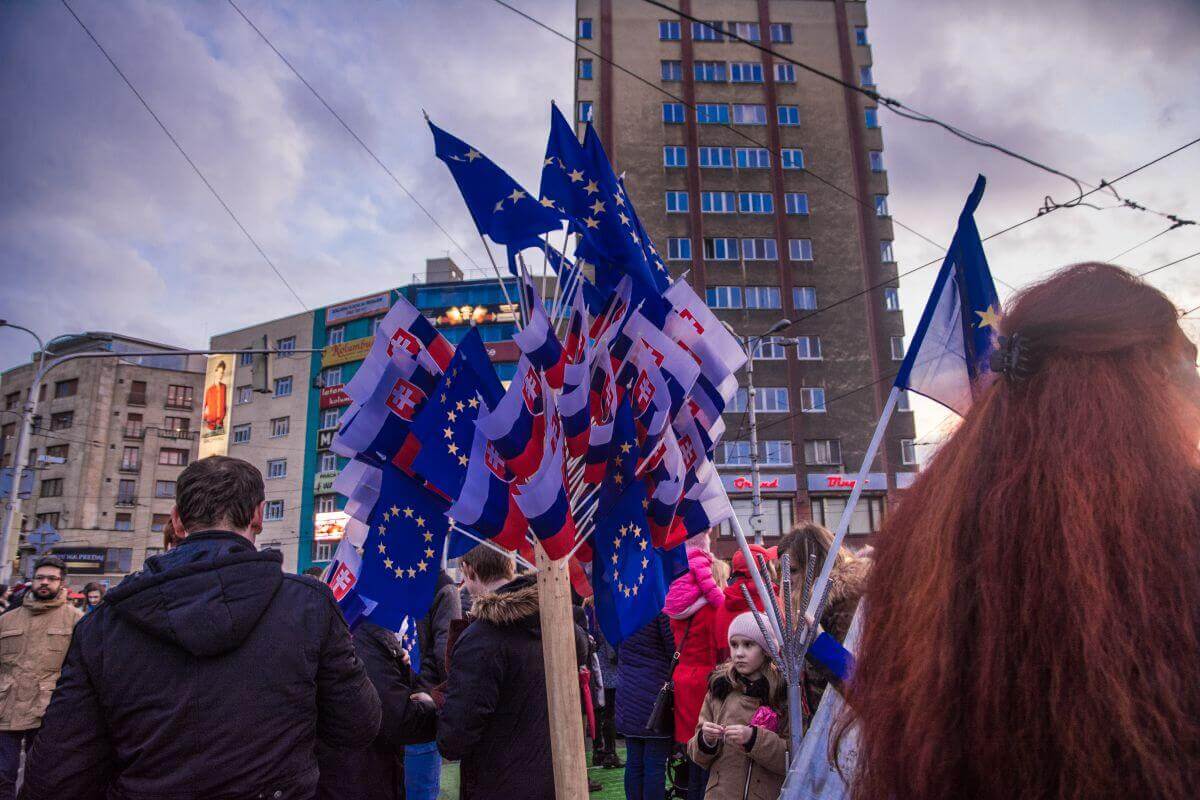
For a decent Slovakia
It is Thursday evening (March 15) and a big protest is planned for tomorrow, organized by the movement, “Let us stand for a decent Slovakia”. Last week the protesters demanded that Prime Minister Robert Fico resigned, along with the Minister of Interior (and vice-PM) Robert Kaliňák. On Friday (March 16), were to meet again in Bratislava and other cities. Slovakia has been in turmoil for three weeks now after the murder of the young journalist Ján Kuciak and his girlfriend Martina Kušnírová. The victims were shot, and the motive is unclear so far, but their deaths launched an avalanche of anti-government protests. The piece Kuciak was working on before his death connected the head advisor of the government office, Mária Trošková, to the Italian mafia. This was compounded by the statement of the state prosecutor Vasil Špirko, according to whom the vice-PM Kaliňák had been corrupt since 2010 at least and had supposedly put pressure on Špirko to stop investigating the case. Anti-corruption marches against Kaliňák took place even before the current crisis.
Near the end of the evening, my companions advise me to ask the protesters why they are protesting, because they will not know what to answer. But when I show up at Slovakian National Revolution Square in Bratislava a day later, it soon becomes obvious that I do not have to ask; the main demand is for new elections. The week before they had demanded the resignations of Fico and Kaliňák, and their demands were met; Fico gave his notice and President Kiska has tasked Peter Pellegrini, from the Smer-SD party, with building a new government and tasked the old one with running the country until the new government is officially named.
The main demand is for new elections.
The calls for elections are being repeated in speeches, the crowd chants their demands, everyone seems to agree that elections are the best solution. So, I ask the people in the crowd what they think the future will hold, who, out of the current opposition, they would like to see in the government. Their responses are ambivalent. “You always have to vote for the lesser evil, but any coalition will be better than the current one” is the most specific answer I get during the protest.
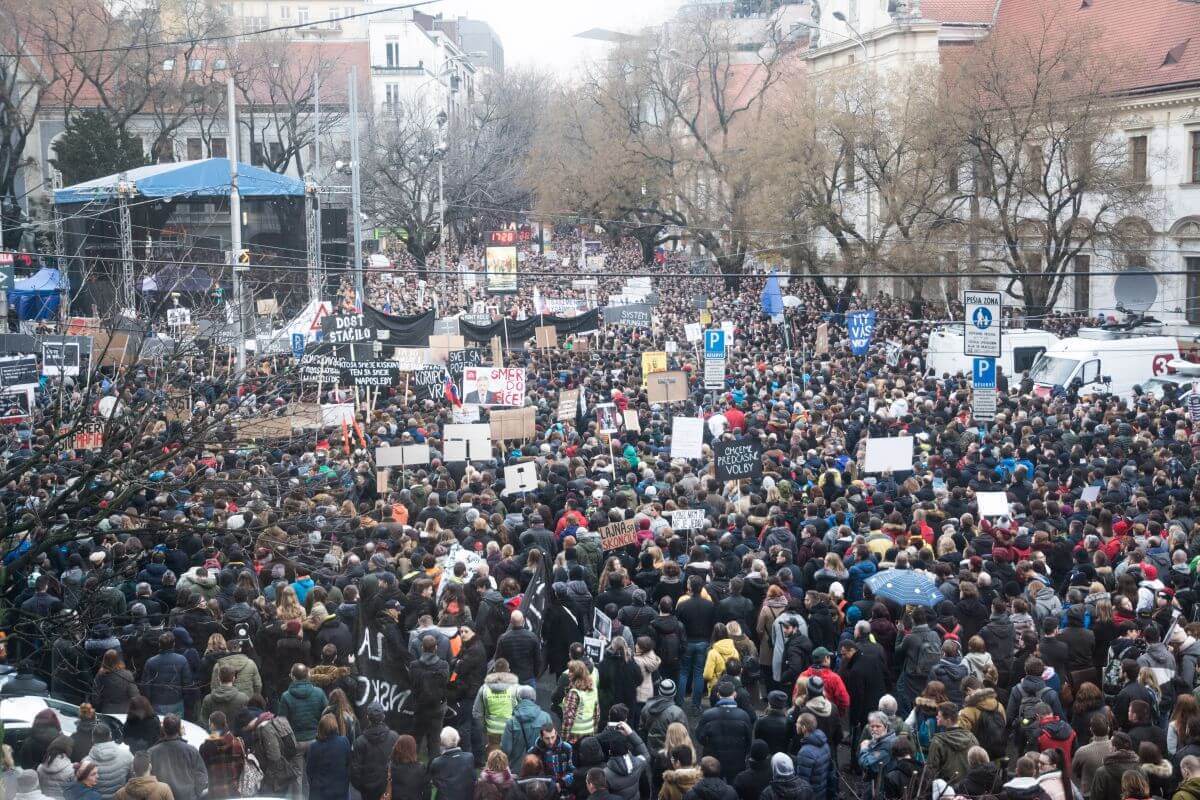
Shades of the Slovakian right
What are the options open to Slovakian liberal voters, of the demographic which makes up the greatest proportion of these protests? Apart from the current ruling parties, that is Smer-SD (social democrats), the Hungarian-Slovakian party Most-Híd, and several ministers from the nationalist conservative Slovakian National Party there are four more options. Freedom and Solidarity (SaS), led by the former economist Richard Sulík, which used to be made up of right-wing liberals verging on being libertarian, but Sulík has changed his rhetoric lately and his anti-European and anti-immigration stance makes him unacceptable for many liberal voters. Then there are the conservative populists, the Common People and Independent Personalities (OLaNO) party, which is a group represented primarily by the entrepreneur Igor Matovič, a man who owns thirty six regional newspapers across Slovakia and who has a reputation for controversial opinions, behavior and general unpredictability. Another subject is the movement We Are Family, headed by Boris Kollár, a social-conservative, which is a xenophobic project representing businessmen often connected to the mafia, and also unacceptable for most liberal voters. Finally, there is the People’s Party Our Slovakia (LSNS) led by Marian Kotleba, fascists.
What are the options open to Slovakian liberal voters?
Outside of Parliament, there is the Party of Hungarian Coalition (SMK), the nationalist remains of the party that spawned the more liberal Most-Híd, and the Christian-conservatives KDH. There are also two smaller liberal projects: Progressive Slovakia, and Together – Civic Democracy, who possess about two and a half per cent of votes together and it remains unclear whether they are going to become allies or even unite and achieve more than five per cent in the next elections.
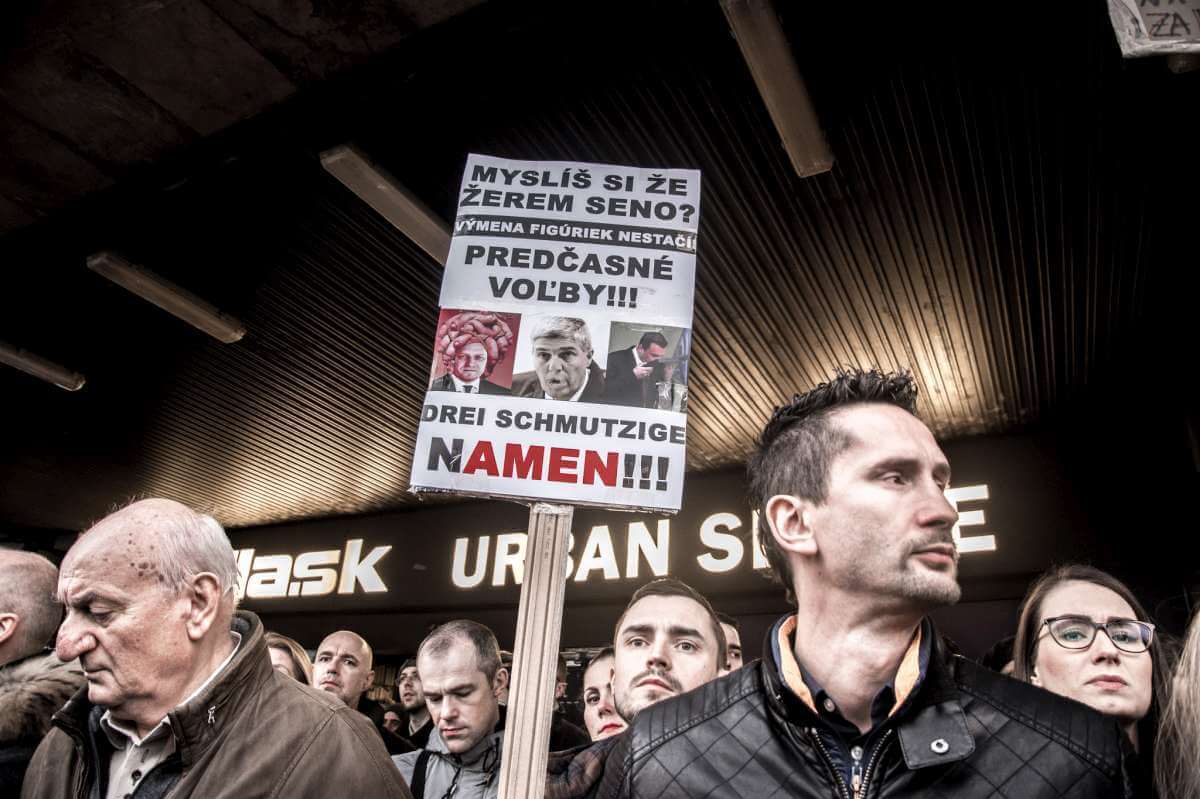
Anyone but Fico
Rado Kovács, teacher and a co-organizer of the movement Let Us Stand for a Decent Slovakia, in Rožňava, thinks the currently re-constructed old government will stay in power until the next regularly scheduled elections take place. And this is unacceptable to him. “I am afraid that if they remain in power until the regular elections, they will manage to disassemble what remains of the state institutions this government has not already destroyed, and we will stop being a democratic country.” However he does not see an optimal coalition forming, even in the case of a premature election. He would like to see a civic party in power, so he would vote for Progressive Slovakia or Together, though he realizes that these two parties have only achieved about two per cent of votes; “What we lack is a real social democratic party – without one, our country is in a bad way.”
What we lack is a real social democratic party.
A somewhat more optimistic opinion was provided by Anton Vydra, a journalist working for the conservative magazine Týždeň (the Week). Vydra is convinced that the opposition parties need to focus on improving themselves rather than just criticizing the coalition government. “Parties like SaS, OLaNO, Progressive Slovakia, Together and even KDH have interesting and hard-working people in them; the problem is the leaders. For example, Veronika Remišová from OLaNO could become a very good politician, but their leader Matovič is completely unpredictable,” claims Vydra. “In spite of that, I think these parties, or rather the people in them, could be capable of cooperation. But we also need to keep in mind the potential success of We Are Family, not to mention Kotleba and LSNS, who have no business being in Parliament.”
Premature elections and anti-European opposition
It seems the next government could consist of Sulík’s SaS, Matovič’s OLaNO, Kollár’s We Are Family or even KDH, with the possible inclusion of either one the Hungarian parties or the nationalists. The situation could be changed by the success of Progressive Slovakia or Together, but this does not seem to be a realistic scenario. “It would be a wide coalition with many contradicting opinions and conflicting personalities. I would estimate its lifespan in months,” comments the political scientist Pavel Hardoš from Bratislava Comenius University. He is afraid of a pre-election campaign run in the style of “who is and is not in the Mafia” and “who is the bigger threat to democracy”. In a polarizing atmosphere – as the latest surveys from Focus show – the social-democratic Smer can weaken, but at the cost of empowering nationalists (SNS), fascists (LSNS) or right-wing populists (We Are Family). “The strong position of populist conservatives and eurosceptics in this coalition raises questions of whether the Polish or Hungarian scenario of an erosion of democracy could take place in Slovakia too,” Hardoš wonders.
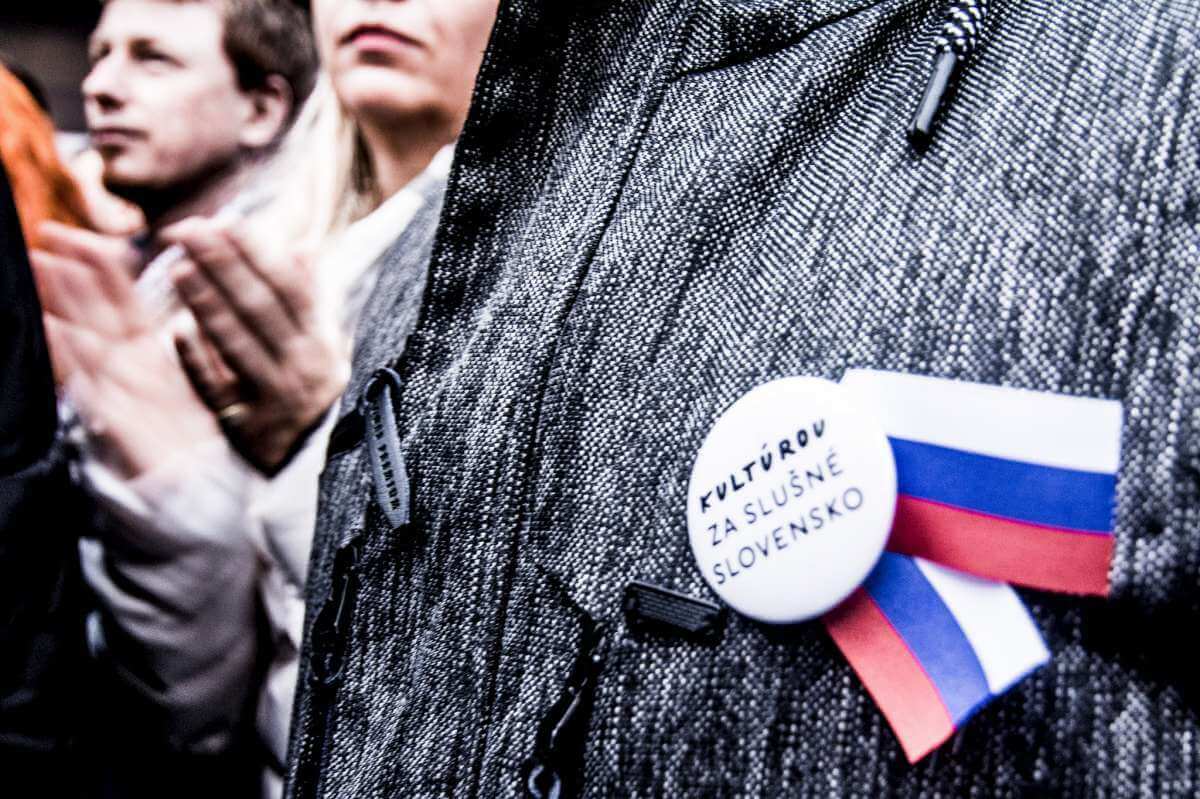
A scenario he would consider acceptable would be elections in the regular term and the current government taking measures to calm the situation down; such as naming an independent candidate as Minister of the Interior, replacing the key personnel within the police and state prosecution and an obligation to see through a reform that would de-politicize the police and ensure its independence. These conditions would also be enough for the lawyer and philosopher Michal Lipták. He is also afraid of a very aggressive campaign in the case of premature elections. “We have seen the direction Fico is willing to take when he mentioned Soros,” he reminds me.
We have seen the direction Fico is willing to take when he mentioned Soros.
According to Lipták, Smer could start to claim that a ‘maidan’, organized abroad, is about to take place in Slovakia and that the country is threatened by subversive elements. The opposition, on the other hand, would base its campaign on the claim that Smer itself is a mafia that kills journalists. “Even the name of these protests – For A Decent Slovakia – is polarizing: is support for the current government, based in the fear that a right-wing alternative would be worse, morally corrupt?” asks Lipták. According to him, people can still vote for Smer-SD out of rational and legitimate reasoning. “It is still the most left-wing side in Slovakia’s political spectrum.” In the case of a government built from the current opposition, Lipták is also afraid of Sulík’s euroscepticism, which could be used as an excuse to solve the current crisis of legitimacy, just replacing Fico’s Soros as the external enemy with Brussels. He does not see a completely positive way out of the current situation, but some options are better than others. “Letting Fico continue in his tenure as PM would definitely be one of the worst options,” he concludes.
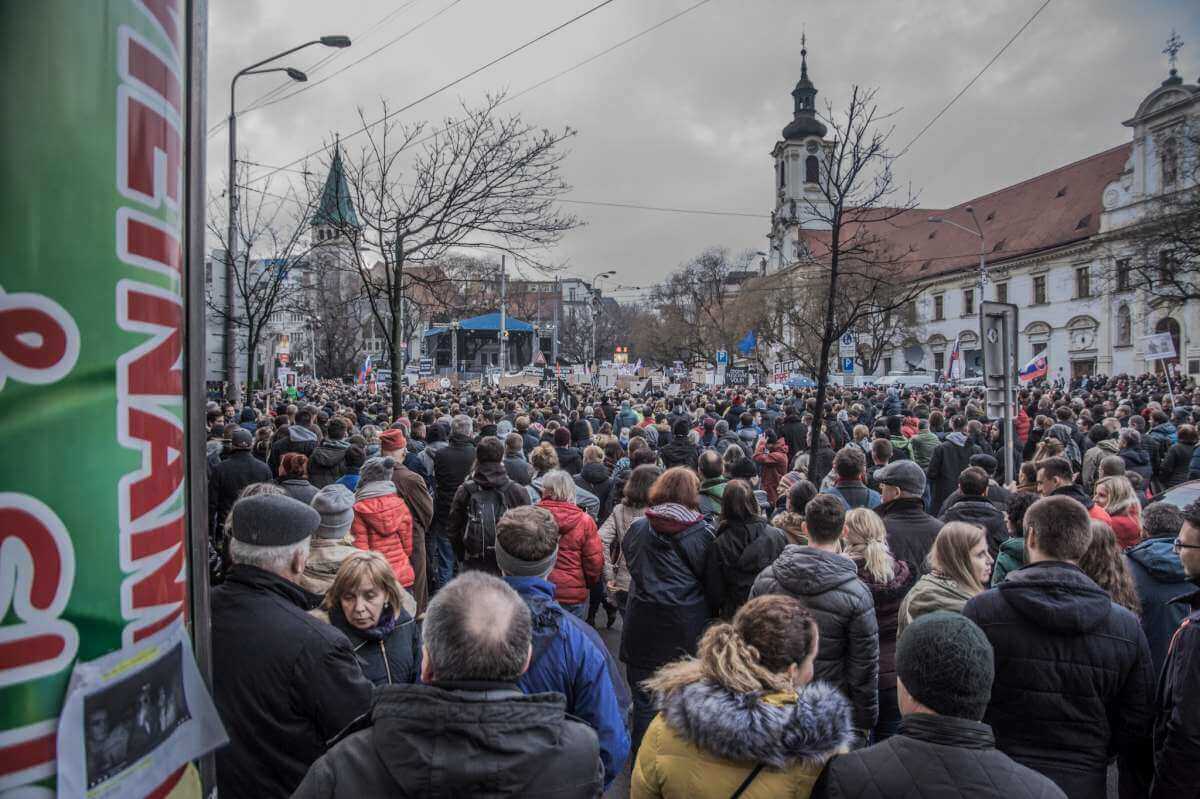
The catch in the constitution
According to the lawyer and constitutional law specialist, Lucie Berdisová, from the Trnava University, premature elections would conflict with the constitutional law on shortening a parliament’s tenure. “There are two basic levels to this: one, the Constitution does not recognize this way of shortening the period before elections. It does list situations in which the President is allowed to dissolve Parliament, but there is no means by which Parliament might do this itself,” Berdisová explains. “If such a law were made, it would not be universally applicable, which is a problem since Parliament is supposed to make rules. So, such a constitutional law would look like a law, but in fact would not be one. It raises the question of whether this would constitute avoiding – or breaking – the Constitution,” says the lawyer.
The second level is that the law would have to be applied retroactively, which is problematic because it disrupts the effectivity of a vote, and the expectations of an electorate which has voted to put the government in power for four years. The Czech Constitutional Court revoked this law, in 2009, because of its conflict with the principles of a democratic legal state. “You can discuss this sort of argumentation but it is not possible to ignore it,” warns Berdisová. A referendum would face a similar issue – even if a sufficient amount of people (350 000) asked for it, a referendum is also meant to create rules and not disrupt the principles of a democratic state.
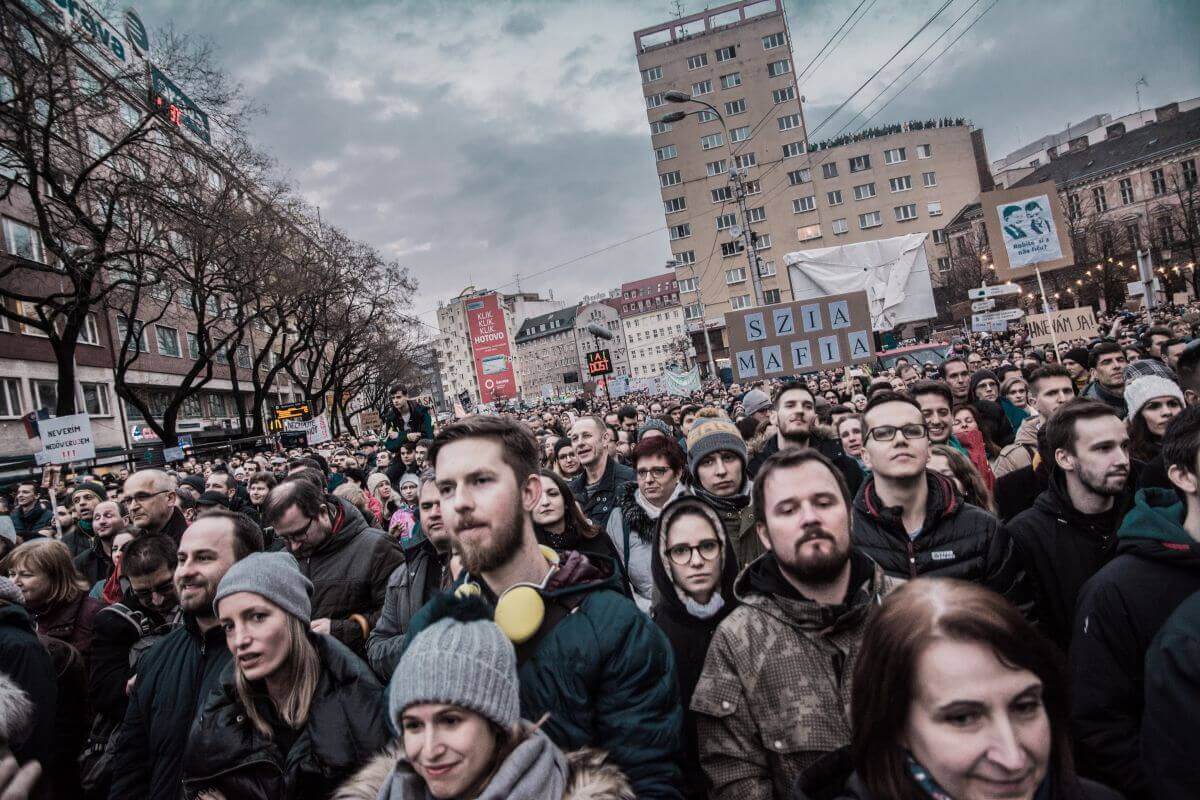
Where next?
On Saturday (March 17), the day after the big protest, I approach people wearing badges from the protest. I ask directly: “Who would you vote for?” And if receive a direct answer, it is always Progressive Slovakia, a party that has 1,4 per cent of votes. The power born in the streets mostly originates from liberals, and while they might well achieve the premature elections they desire, they lack a political alternative that would actually be capable of getting into Parliament. Some of the people I approach hope for an independent government made up of officials, so that society can relax and find other alternatives, but others dismiss this solution as too temporary. Yet another group responds that the important thing is not the election, but that people in the streets show that they have had enough and demand change.
Let us hope that the most pessimistic scenarios will not come.
At the moment, it is not clear whether there will be premature elections or not, or what the results would be if there were. The lesson learned from the last elections was that, as in the Czech Republic, pre-election surveys can be drastically different from actual electoral results. The future is still uncertain, no matter when the elections take place. Let us hope that the most pessimistic scenarios will not come to pass and that Slovakia will not go the way of Hungary and Poland.
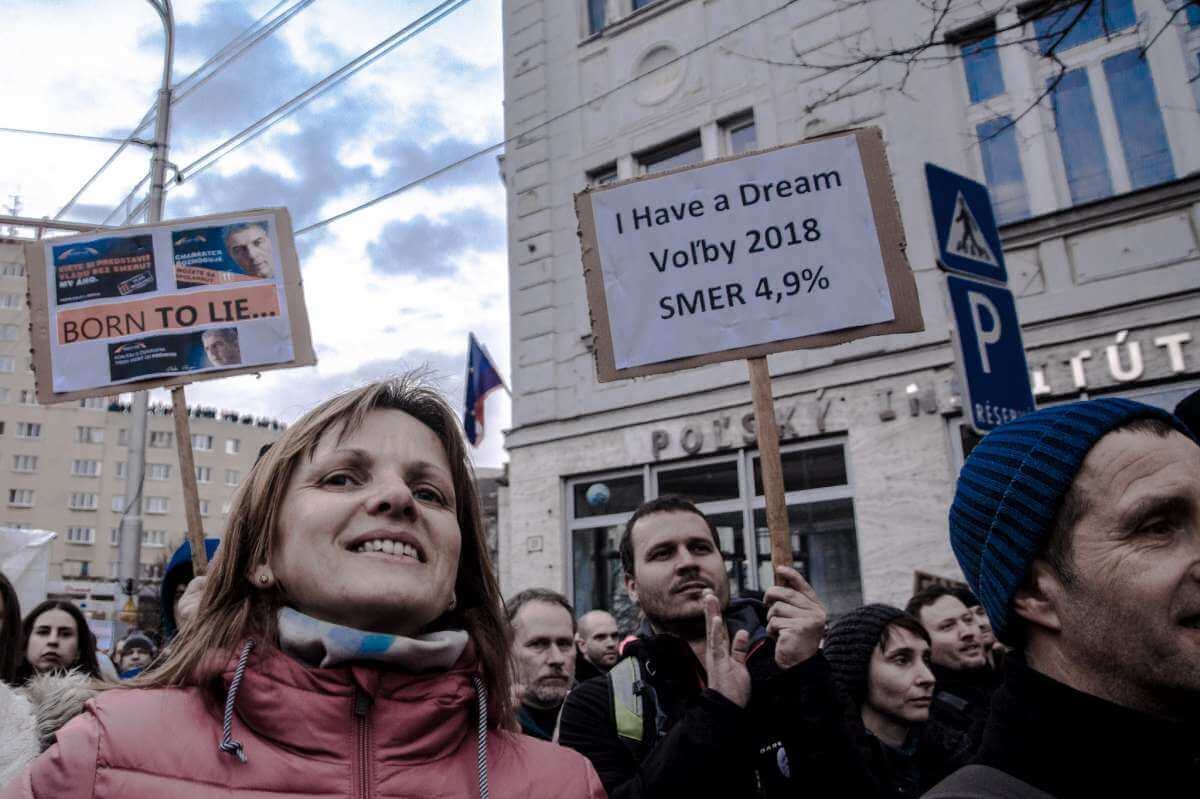
***
![Political Critique [DISCONTINUED]](https://politicalcritique.org/wp-content/uploads/2015/09/Political-Critique-LOGO.png)
![Political Critique [DISCONTINUED]](https://politicalcritique.org/wp-content/uploads/2015/09/Political-Critique-LOGO-2.png)